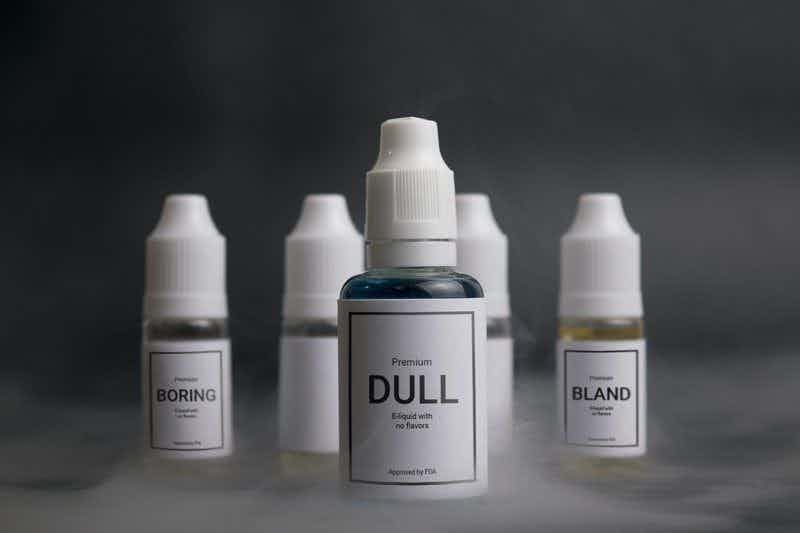The FDA announced today it has rejected 55,000 Premarket Tobacco Applications (PMTAs) from three small e-liquid manufacturers. That eliminates about two percent of the more than two million remaining of the 6.5 million PMTAs originally submitted before last year’s Sept. 9 deadline.
More importantly, the federal regulator seemed to indicate that it will probably not authorize any bottled e-liquid in flavors other than tobacco. With two weeks before the Sept. 9, 2021 grace period is up, that will likely mean rejection for almost all of the remaining PMTAs.
The agency calls the letters sent to the three businesses “marketing denial orders” (MDOs), and they are the first outright rejections of any products that have been submitted. The products receiving MDOs must be immediately removed from the market or risk FDA enforcement.
The companies sent MDOs are JD Nova Group LLC (Vapolocity), Great American Vapes, and Vapor Salon. JD Nova was the subject of a previous FDA action; FDA refused to file PMTAs for 4.5 million of their products. According to the FDA, the three companies still have some (presumably tobacco-flavored) products undergoing scientific review.
All of the products were “flavored”—by which the FDA means flavored with anything but tobacco flavorings. In its explanation, the agency seems to signal that no flavored open-system products (bottled e-liquid) will be authorized. That’s exactly the kind of “regulation” that anti-vaping organizations like the Campaign for Tobacco-Free Kids and grandstanding politicians like many state attorneys general have demanded.
“In light of the public health threat posed by the well-documented, alarming levels of youth use of flavored ENDS, the agency has reviewed the applications subject to this action to determine whether there is sufficient product-specific scientific evidence to demonstrate enough of a benefit to adult smokers that would overcome the risk posed to youth,” the FDA said.
“Based on existing scientific evidence and the agency’s experience conducting premarket reviews, the evidence of benefits to adult smokers for such products would likely be in the form of a randomized controlled trial or longitudinal cohort study, although the agency does not foreclose the possibility that other types of evidence could be adequate if sufficiently robust and reliable. Because this evidence was absent in these applications, the FDA is issuing MDOs.” (Emphasis added.)
While possible, it’s unlikely that any independent vaping business has developed “product-specific evidence” of the value of flavors. The agency calls for randomized controlled trials. Designing and completing such a trial for a specific bottled e-liquid would cost millions of dollars.
The unpublished standard the FDA seems to be applying to most of the products submitted for review is attainable only for tobacco companies and possibly the largest independent companies, like Juul Labs and NJOY.
“The burden is on the applicant to provide evidence to demonstrate that the marketing of their product meets the statutory standard of ‘appropriate for the protection of the public health,’” said FDA Center for Tobacco Products director Mitch Zeller. “If this evidence is lacking or not sufficient, the FDA intends to issue a marketing denial order, which requires the product to be taken off or not introduced to market.”
The FDA says it will “continue to review other premarket tobacco applications for non-tobacco flavored ENDS to determine whether there is sufficient product-specific scientific evidence of a benefit to adult smokers to overcome the risk posed to youth,” but the agency is well aware that such evidence will not be found in those PMTAs—at least not for the more than 500 companies that don’t have billions of disposable dollars.
“If the applications contain evidence of this type, the FDA will conduct further in‐depth scientific evaluation as to whether the evidence satisfies that statutory standard for authorization. But in the absence of this evidence, the agency intends to issue an MDO.”
The FDA announcement will probably cause a panic among small e-liquid companies, who depend on non-tobacco flavored products for the bulk of their income. Many companies have already spoken privately about reformulating their e-liquid with synthetic nicotine—or closing and operating as black market sellers. Others may hope for approval of tobacco flavors and try to make a go of surviving with those.
One of the three companies that received an MDO today has already announced it will relaunch its products with synthetic nicotine. The FDA’s Tobacco Control Act mandate is to regulate nicotine “derived from tobacco.” Regulating synthetic products might require new FDA rulemaking—or an act of Congress.
What is clear is that the FDA never intended to fairly regulate open-system vape products. From the 2014 draft release of the agency’s Deeming Rule until today, the Center for Tobacco Products has looked forward to the moment it would eliminate the “wild west” of the independent industry and turn vaping over to the same corporate tobacco behemoths this disruptive technology was designed to replace.
That day is close, and soon the FDA will have to contend with an angry army of disorganized small businesses that will be proud to break its unjust rules that do not protect public health.

Jim McDonald
Vaping for: 13 years
Favorite products:
Favorite flavors: RY4-style tobaccos, fruits
Expertise in: Political and legal challenges, tobacco control haters, moral panics
Jim McDonald
Smokers created vaping for themselves without help from the tobacco industry or anti-tobacco crusaders, and I believe vapers and the vaping industry have the right to continue innovating to give everyone who wants to use nicotine access to safe and attractive non-combustible options. My goal is to provide clear, honest information about vaping and the challenges nicotine consumers face from lawmakers, regulators, and brokers of disinformation. You can find me on Twitter @whycherrywhy


